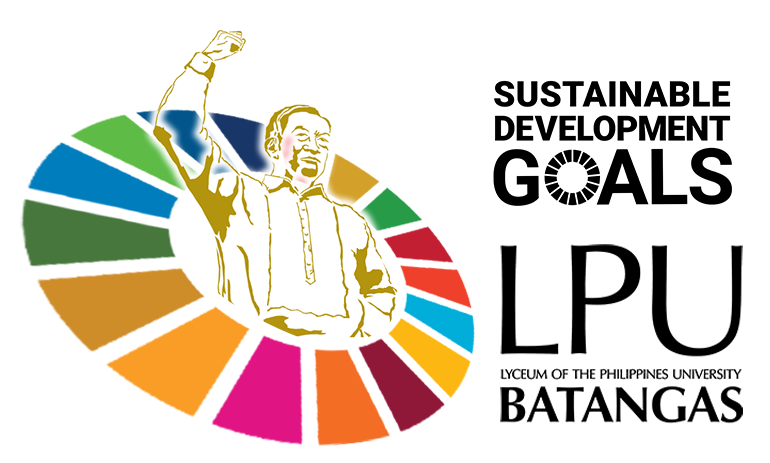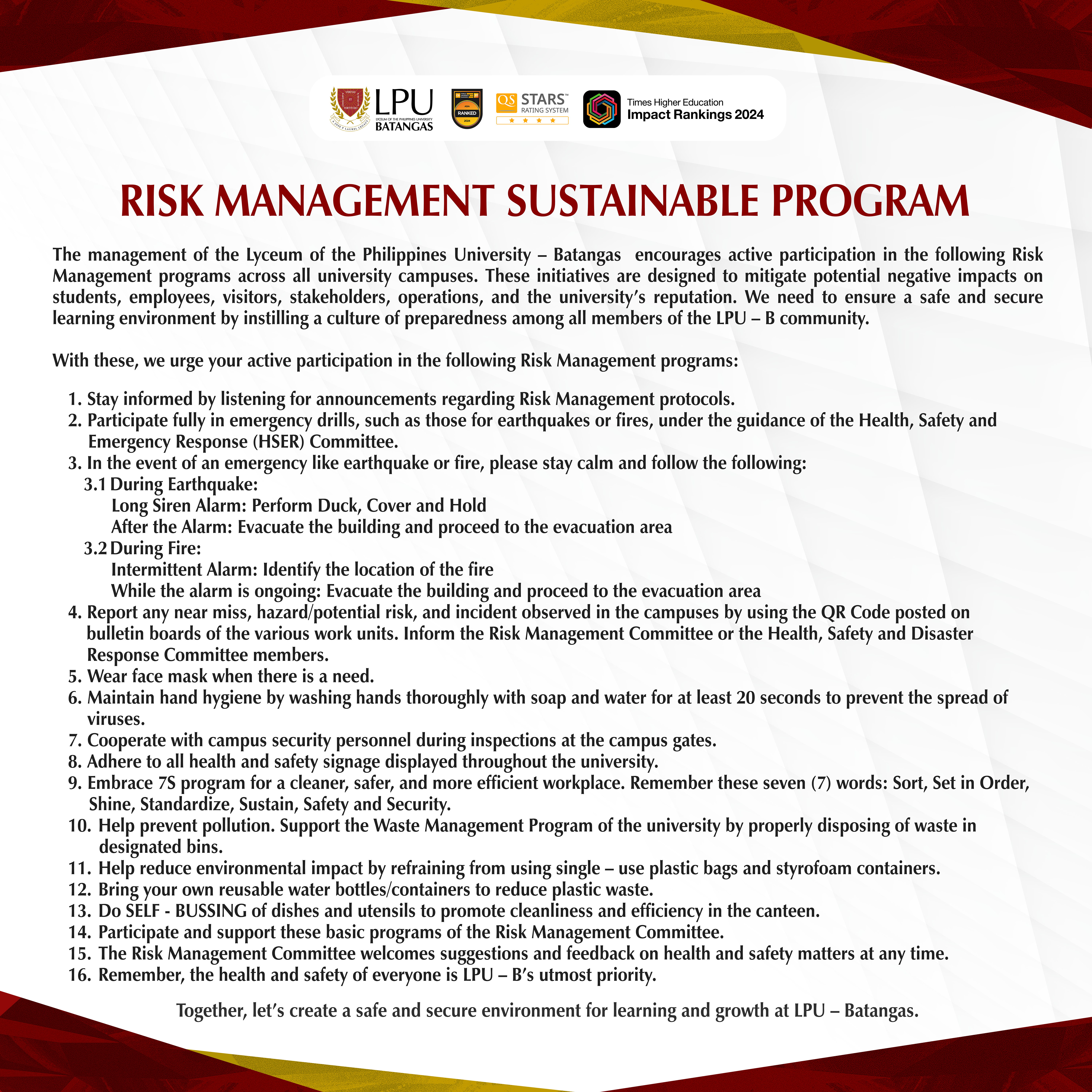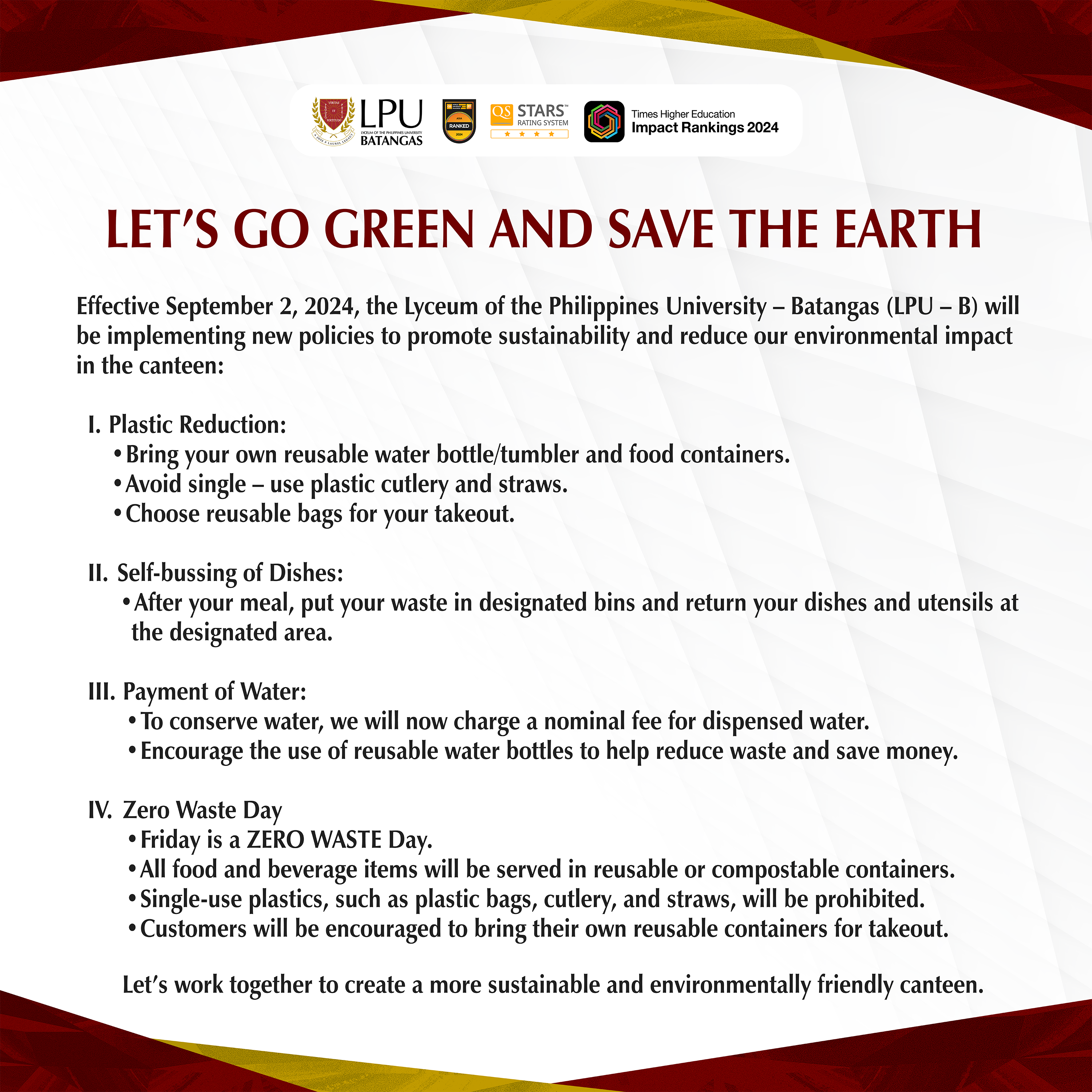LPU-Batangas and Laguna to aggregate electricity demand with First Gen Corporation
Views: 280



Sustainable Horizon is an innovative LPU initiative dedicated to driving positive change and fostering sustainability within our community and beyond. At LPU, we recognize the urgent need to address global challenges such as climate change, poverty, inequality, and environmental degradation. Inspired by the United Nations Sustainable Development Goals (SDGs), we have embarked on a transformative journey to contribute meaningfully to creating a better world for present and future generations.
LPU Sustainable Horizons serves as a holistic platform that integrates education, research, innovation, and community engagement to advance the SDGs. Through this initiative, we aim to empower our students, faculty, staff, and partners to become catalysts for sustainable development, driving impactful solutions and initiatives that address pressing societal and environmental issues.

The Center for Sustainable Transformation is a research and action hub dedicated to advancing the United Nations 2030 Sustainable Development Goals (SDG) through innovative solutions and transformative initiatives.
To be a leader in driving sustainable transformation for a more equitable, resilient and thriving world, in alignment with the United Nations Sustainable Development Goals
The Center for Sustainable Transformation is committed to advancing the UNs Sustainable Development Goals through innovative research, education, collaboration, and advocacy. We strive to drive transformative solutions that address the interconnected challenges of environmental degradation, social inequality, and economic instability, leading to a prosperous and resilient future for the next generations.
Integrating the UN 2030 Agenda SGDs in the university is crucial in addressing global challenges since it provides a comprehensive framework for addressing some of the world’s most pressing challenges, such as poverty, inequality, climate change, and environmental degradation. The university plays a critical role in equipping students with the knowledge, skills and values needed to address these challenges .
Higher education institutions have a responsibility to meet the needs of the society by aligning the programs and activities with the needs of the community.
By integrating SDGs in the curriculum, students will develop a sense of responsibility towards society and the environment. It can also promote innovation by encouraging students and faculty to develop new solutions to the world’s most pressing challenges and create a more sustainable future for all.
The SDG committee headed by the Vice President for Academics and Research shall promote and implement sustainable development practices and initiatives. The primary committee is composed of deans, and department heads, while the sub-committee includes teachers, students, and administrative staff and its main purpose is to support the integration of the SDGs into the school’s curriculum, operations, and culture.
By creating an SDG committee, the university can take a proactive approach to promoting sustainable development and contribute to the achievement of the SDGs.
The purpose of an SDG committee is to promote sustainable development within an organization by identifying and prioritizing the Sustainable Development Goals (SDGs) and developing initiatives and strategies to achieve them.
The committee’s scope includes:


The Center for Sustainable Transformation is a research and action hub dedicated to advancing the United Nations 2030 Sustainable Development Goals (SDG) through innovative solutions and transformative initiatives.
To be a leader in driving sustainable transformation for a more equitable, resilient and thriving world, in alignment with the United Nations Sustainable Development Goals
The Center for Sustainable Transformation is committed to advancing the UNs Sustainable Development Goals through innovative research, education, collaboration, and advocacy. We strive to drive transformative solutions that address the interconnected challenges of environmental degradation, social inequality, and economic instability, leading to a prosperous and resilient future for the next generations.
Integrating the UN 2030 Agenda SGDs in the university is crucial in addressing global challenges since it provides a comprehensive framework for addressing some of the world’s most pressing challenges, such as poverty, inequality, climate change, and environmental degradation. The university plays a critical role in equipping students with the knowledge, skills and values needed to address these challenges .
Higher education institutions have a responsibility to meet the needs of the society by aligning the programs and activities with the needs of the community.
By integrating SDGs in the curriculum, students will develop a sense of responsibility towards society and the environment. It can also promote innovation by encouraging students and faculty to develop new solutions to the world’s most pressing challenges and create a more sustainable future for all.
The SDG committee headed by the Vice President for Academics and Research shall promote and implement sustainable development practices and initiatives. The primary committee is composed of deans, and department heads, while the sub-committee includes teachers, students, and administrative staff and its main purpose is to support the integration of the SDGs into the school’s curriculum, operations, and culture.
By creating an SDG committee, the university can take a proactive approach to promoting sustainable development and contribute to the achievement of the SDGs.
The purpose of an SDG committee is to promote sustainable development within an organization by identifying and prioritizing the Sustainable Development Goals (SDGs) and developing initiatives and strategies to achieve them.
The committee’s scope includes:


Send us your inquiries and we would be glad to answer them.
| Cookie | Duration | Description |
|---|---|---|
| cookielawinfo-checkbox-analytics | 11 months | This cookie is set by GDPR Cookie Consent plugin. The cookie is used to store the user consent for the cookies in the category "Analytics". |
| cookielawinfo-checkbox-functional | 11 months | The cookie is set by GDPR cookie consent to record the user consent for the cookies in the category "Functional". |
| cookielawinfo-checkbox-necessary | 11 months | This cookie is set by GDPR Cookie Consent plugin. The cookies is used to store the user consent for the cookies in the category "Necessary". |
| cookielawinfo-checkbox-others | 11 months | This cookie is set by GDPR Cookie Consent plugin. The cookie is used to store the user consent for the cookies in the category "Other. |
| cookielawinfo-checkbox-performance | 11 months | This cookie is set by GDPR Cookie Consent plugin. The cookie is used to store the user consent for the cookies in the category "Performance". |
| viewed_cookie_policy | 11 months | The cookie is set by the GDPR Cookie Consent plugin and is used to store whether or not user has consented to the use of cookies. It does not store any personal data. |